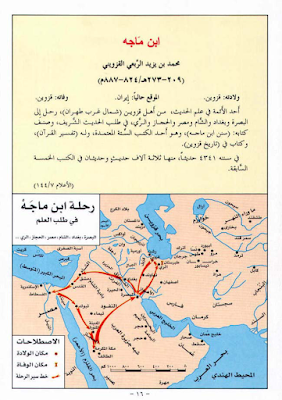Ibn Majah Travel Map
Ibn Mājah was born in Qazwin, the modern-day Iranian province of Qazvin, in 824 CE/209 AH[1] to a family who were clients (mawla) of the Rabīʻah tribe.[2] Mājah was the nickname of his father, and not that of his grandfather nor was it his mother's name, contrary to those claiming this. The hāʼ at the end is un-voweled whether in stopping upon its pronunciation or continuing because it a non-Arabic name.[2]
He left his hometown to travel the Islamic world visiting Iraq, Makkah, the Levant and Egypt. He studied under Abū Bakr ibn Abī Shaybah (through whom came over a quarter of al-Sunan), Muḥammad ibn ʻAbdillāh ibn Numayr, Jubārah ibn al-Mughallis, Ibrāhīm ibn al-Mundhir al-Ḥizāmī, ʻAbdullāh ibn Muʻāwiyah, Hishām ibn ʻAmmār, Muḥammad ibn Rumḥ, Dāwūd ibn Rashīd and others from their era. Abū Yaʻlā al-Khalīlī praised Ibn Mājah as "reliable (thiqah), prominent, agreed upon, a religious authority, possessing knowledge and the capability to memorize."[1]
According to al-Dhahabī, Ibn Mājah died on approximately February 19, 887 CE/with eight days remaining of the month of Ramadan, 273 AH,[1] or, according to al-Kattānī, in either 887/273 or 889/275.[2] He died in Qazwin.[2]
Read More=>Ibn Majah
He left his hometown to travel the Islamic world visiting Iraq, Makkah, the Levant and Egypt. He studied under Abū Bakr ibn Abī Shaybah (through whom came over a quarter of al-Sunan), Muḥammad ibn ʻAbdillāh ibn Numayr, Jubārah ibn al-Mughallis, Ibrāhīm ibn al-Mundhir al-Ḥizāmī, ʻAbdullāh ibn Muʻāwiyah, Hishām ibn ʻAmmār, Muḥammad ibn Rumḥ, Dāwūd ibn Rashīd and others from their era. Abū Yaʻlā al-Khalīlī praised Ibn Mājah as "reliable (thiqah), prominent, agreed upon, a religious authority, possessing knowledge and the capability to memorize."[1]
According to al-Dhahabī, Ibn Mājah died on approximately February 19, 887 CE/with eight days remaining of the month of Ramadan, 273 AH,[1] or, according to al-Kattānī, in either 887/273 or 889/275.[2] He died in Qazwin.[2]
Read More=>Ibn Majah
Ibn Majah Travel Map - DR. Syauki Abu Khalil.
Thank's

